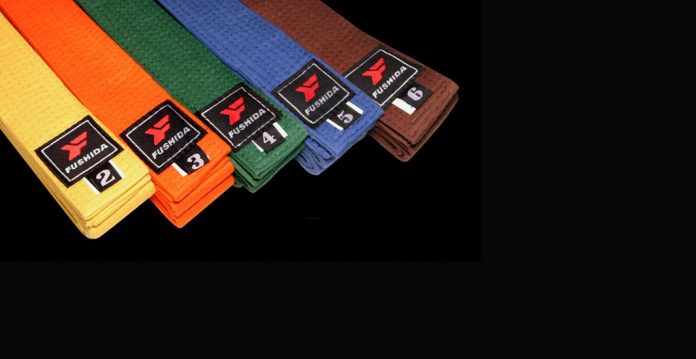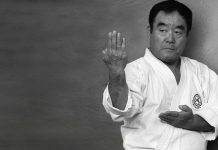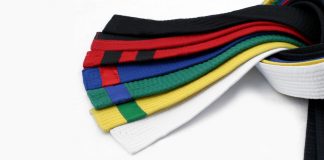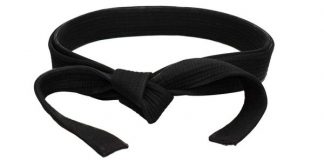Kano no doubt realized, when he popularized the kyu-dan rank system, that it is perfectly natural for humans to seek reward for their exertions. But he also placed great faith in man’s ability to use Judo rank properly.
Editors note: This article does not reflect the ranking situation that exists in the year 2000. The article is important because of its historical nature. Edited by Dennis Helm
This article was first published in the 1970 Official AAU USJF Judo Handbook
By Donn F. Draeger ~ BACKGROUND – there is an old verbal equation, which summarizes all that is important about rank in the Japanese martial arts (bugei) and ways (bude). It goes simply like this: “Rank follows the man,” This equation is replete with significance, some of which are the object of this article.
By way of background concerning the existing Judo ranking system, it is first of all important to take a mental step back into history to a time when the Japanese warrior ruled Japan. The matters of genealogy and court rank were important to the nobles who had, since the earliest primitive societies, assumed the responsibility for administering the country. But these nobles lacked the ability to defend their court, let alone organize the entire country; unruly groups resisted national organization. And so there was occasioned the need for professional warriors (bushi) to act as the “claws and teeth” of the court. Several important families vied for that honor. Given the chance to rule Japan, the warriors eventually took over control of the government and originally did an excellent job of stabilizing the Japanese nation.
The warrior, however was not easily allowed to share court ranks. He was, nevertheless proud of his ancestral heritage, which in many cases stemmed from noble background. Expertises with martial arts (ryu) were established to perpetuate the martial arts and it became perfectly natural for each of these traditions to establish its own ranking system for the purpose of identifying the skill of its topmost exponents. Technical skill, while being the essence of such ranks, was not the only essential consideration in determining rank. Of almost equal importance was the necessity for the exponent to be a mature person who was highly dedicated to the social responsibilities of the tradition. Depending upon the specific tradition, such ranking systems can be characterized by the use of from two to seven different levels of rank; for the purpose of this article it will be sufficient to consider a ranking system with four levels.
The (oku-iri) “entrance to secrets” was the first credential. It signified the bearer as an accomplished warrior-exponent and an instructor of the tradition, which he represented. The (moku roku) “catalogue” was a middle-step rank, which certified the exponent as an experienced fighter and instructor. A highly skilled technician and seasoned warrior was identified by the (menkyo) “license.” But it was the last level, the (kaiden) “everything passed” which stood for the master technician – warrior.
Jigoro Kano, founder of Kodokan Judo did not attempt to apply the classical rank system to his Judo. Instead Kano developed the Kyu–Dan system. By awarding (kyu) “class,” Kano identified his (mudansha) “ungraded” Judoka; by the (dan) “graded,” his (yudansha) “graded” Judoka.
COMPONENTS and CONSIDERATIONS IN TRUE JUDO RANK – Kano had very specific things in mind when he instituted the kyu-dan system.. Above all, Kano was vitally interested in development of the whole man, what is, in man’s physical, mental, and moral culture. Unless a Judo exponent made sufficient efforts to establish improve, and maintain the harmony between these three important aspects, the Judoka could never hope to perfect himself nor advance far under the Kodokan ranking system. Kano referred to the process of this development as the “Three Culture Principle” and based the elements of his Judo ranking system on it.
Judo training in Kano’s day began with sensible physical training experiences. Perfection of the “self,” in a physical sense, became possible through constant dedication to training through the methods of (randori) “free exercise,” (kata) “pre-arranged form,” and (shiai) “contest.” The percentage of time to be devoted to each of these entities was approximately 80:17:3, respectively. In regard to the shiai, Kano stressed that competitive Judo was not the intended goal or end point of Judo training. It was, rather, only one means to the end of total self-perfection. Training in Judo contest methods alone, or with an overemphasis on contest skills cannot satisfy the “Three Culture Principle.” Cannot lead to total self-perfection, and therefore cannot be the sloe basis for advancement in Judo rank. Thus Kano struck deeper into man’s purpose on earth…contribution to the social welfare of the world …making the physically fit body only the foundation upon which the intellect was to be crowned and upon which personal virtue was to be established.
Kano, maintained that all Judo exponents must make strong efforts to develop their minds, for the well-trained mind is incapable of rash and anti-social actions. Development of the mind, for Kano, was obtainable by the use of good habits in thought and judgment as normally accrue to dedicated exponents of Judo who engage in regular exercise of Judo techniques. A Judoka who trains correctly activates his mind and fully exercises his powers of reasoning, imagination, and observation; a; of these qualities are transferable into activities surrounding daily life. Habits of preparation and quick decision are fostered through Judo training, and in Kano’s eyes, were not simply seen in the ability of an exponent to throw or grapple skillfully with an opponent, nor in the “winning” of Judo contests, but rather in the Judo exponent demonstrating a sense of social responsibility in daily life.
Kano also insisted that moral training must begin with self-discipline, that is, voluntarily imposed and maintained habits of living. The Judoka who trains himself correctly perhaps first learns not to be careless about his habits of health; he must devote himself to austere living conditions, if he is to make optimum progress. Living otherwise is to divert energy, to give birth of negligence and mediocrity. All of which invariably lead to failure along the way of total self-perfection, the endpoint of all Judo training. Injurious passions such as intend to dissipate the energies of body and mine, are implicitly injurious to the progress of any Judoka. Lush living only succeeds in beautifying the external, but not the internal man. But Kano was more interested in the internal man so encouraged the understanding of hardships such as are liberally available through the exercise of Judo training methods. Hardships steel the Judo trainee’s mind and build for him a high threshold of endurance to adversity. Through the application of the prescribed physical and mental disciplines of Judo, Kano believed that personal moral virtues could be harnessed and moral courage developed. “The body must of necessity be effective in attaining the objective of life,” wrote Kano. Training in Judo develops a sense of honor in each Judoka when the Judoka holds his privilege to participate in Judo as something sacred. Furthermore, a Judoka who trains correctly, learns to act in accord with what is just or righteous, and thus a sense of justice becomes foremost in his mind. Respect for the truth follows the development of a sense of justice. Also essential to any Judoka’s progress is the ability to accept self-sacrifices. The exercise of kindness and discernment in dealings with others all in the spirit of cooperation, was yet another earmark of the mature Judoka in Kano’s eye. The external wrapping for the whole man was seen by Kano in the Judoka’s dignity of demeanor, for etiquette is the springboard of courage as displayed by the mature man.
WHO MAY GRANT KODOKAN JUDO RANK – It is essential to realize that since Kodokan has always been essentially a plebian-direct effort, in contrast to the martial arts of the aristocratic warriors, Kano intended that recognition in the form of Judo rank be made available to all those persons who would but persevere with the prescribed Judo disciplines. Only Kodokan was, and is today, authorized to decide upon and grant Kodokan Judo ranks. But in order to facilitate the matter of Judo examinations for qualified Judoka, Kodokan has authorized the creation of specific official examining boards. These boards periodically make recommendations for advancement in Judo rank of Judoka under their jurisdiction. Thus it is that such examining boards only make recommendations for ranks; only Kodokan can approve and reward ranks. It is this relationship, which is misunderstood, especially in the west.
JUDO RANK AND THE MODERN SCENE – Though Kano intended a more full-bodied meaning for Judo as indicated by his “Three Culture Principle,” Judo as interpreted in the modern sense has narrowed its scope and is definitely programmed toward the application of Judo as a sport. Accordingly, this process of narrowing has compressed the integrity of Judo ranks right out of the system. To see this more easily, a short comparison between modern Judo rank and older, classical systems of the martial arts may be helpful. There has never been any equivalents intended between the kyu-dan and classical ranking system, but the two can be laid side by side to give a rough comparison. The oku-iri is the equivalent of senior 3 dan to 4 dan level; the mokuroku fits the 5 dan to 7dan inclusive; the menkyo approximates the 8 dan to 9 dan levels; and the kaiden may be taken as the 10 dan level. Both the modern kyu-dan and classical rank systems of the martial arts are concerned with the level of technical skill attained by their respective exponents, but only the classical systems achieve integrity in this matter. For example, it is not possible for a lower – ranked exponent to be more skillful and effective than his senior under the classical systems; in Judo, however, it is frequently the case. So strict is the matter of integrity of rank in the classical systems that even though a legitimate blood – line heir succeeds as headmaster of his family tradition, he is not eligible to assume rank of any level. Should he, on the other hand, be accomplished in a technical sense by deficient in the sense of personal maturity, he likewise cannot assume and rank. In the kyu-dan system rank often becomes a matter of political expediency concomitant with the assumption of some kind of administrative title or authority. Therefore Judoka who are less than technically qualified can, and do, receive Judo rank. Then too, the technically skilled and contest effective Judoka who has little beyond his skill to show for his training efforts, often moves readily up the ladder of Judo rank.
The matter of inequality and confusion over the problem of what Judo rank must stand for in the modern world is no doubt the result of the mass popularity of Judo and the lack of strict control over it by senior authority. Judo was designed as something, which everyone can do; and “everyone” is doing it. As a consequence, there are as many interpretations of what Judo rank is, as there are individuals attempting to reward or use it. In spite of that apparent chaotic condition the prognosis for the restoration of integrity of Judo rank is bright. There is a strong trend afoot to return to the Kanoian concept of what Judo rank really stands for and to whom it may be awarded. Kodokan has recognized certain specific national bodies to make recommendations for rank throughout the world; only these national bodies have this Kodokan issued and recognized authority. In the U.S.A. the only official body is the United States Judo Federation (formerly the Judo Black Belt Federation). The U. S. Judo Federation (USJF) is also fully supported in matters of rank by the International Judo Federation (1970). Kodokan has been highly selective in its choice of official national bodies across the world and consequently there are many Judo groups aspiring to attain that recognition but who have failed to do so. In some cases such failures has resulted in the amalgamation between unrecognized groups and their national bodies also occurred. The fractionation between Judo groups is perhaps as natural as it is unavoidable, but must not be construed as justification for the assumption of rank – granting authority by the unrecognized groups.
Kano no doubt realized, when he popularized the kyu-dan rank system, that it is perfectly natural for humans to seek reward for their exertions. But he also placed great faith in man’s ability to use Judo rank properly. Many Judoka have yet to demonstrate that they understand the spirit of Kodokan rank. Those Judoka who accept the rank from other than their official national Judo body can rightfully be accused of misunderstanding the spirit of Kodokan Judo. Not only have they reversed the equation, which was stated at the beginning of this article (an action which automatically negates the value of Judo rank), but in their selfish and immature quest for favor, rewards, gaining of power (real or imagined), social prestige, or commercial advantage, dissident Judoka and groups have only succeeded in lowering the standards of the very cause which they support as being superior to Kodokan recognized authority. Through their act of creation and use of non-official Judo rank, dissidents egotistically place their technical ability above that of recognized authority. In their acceptance of other than official Judo rank such persons not only receive an inferior product of rank, but are allowing it to be bestowed on inferior types of person…themselves…inasmuch as they have disregarded the “Three Culture Principle” upon which Judo rank is based; by definition any rupture with Kodokan authority is at variance with this important principle of Kano’s.
Close examination of Kodokan ideal reveals that is not, as some dissidents would have it, outmoded. It is as valid today as it ever was, an important social movement so necessary in the modern world. Those dissidents who would brand Kodokan recognized authority as inefficient or biased and who would further use such argument as justification for breaking ties with official national Judo authority are only admitting their failure to harmonize with an established order; rather they should contribute constructive measures to the improvement of the national Judo establishments as an active and cooperative member of its functions At the base of all leaders of dissident Judo factions is the fact that they are displeased with their rank and station in the recognition scheme of things. Their equation is “The man follows rank.” Striving for, and misuse of Judo rank is alien to the spirit of Judo; the substitution of Kodokan Judo rank by unofficial rank constitutes an act of expediency, which plays into the raw ego and stands as the antithesis of the essence of Kodokan Judo. It is understandable that there will always be a certain preoccupation with rank, but when the desire for recognition or reward becomes so compelling that individuals accept it on any terms, then they fall easy prey to the unprincipled who would use rank as a political or financial means to their own end. Judo ka who can live up to the strict standards of Kodokan have no need for other than officially recognized Judo rank, and they honor the equation that valid rank must “follow the man.”






